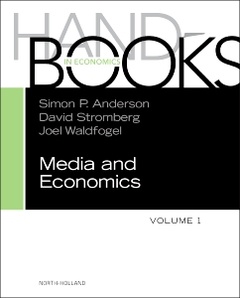Handbook of Media Economics, vol 1A
Coordonnateurs : Anderson Simon P., Waldfogel Joel, Stromberg David

Handbook of Media Economics provides valuable information on a unique field that has its own theories, evidence, and policies. Understanding the media is important for society, and while new technologies are altering the media, they are also affecting our understanding of their economics.
The book spans the large scope of media economics, simultaneously offering in-depth analysis of particular topics, including the economics of why media are important, how media work (including financing sources, institutional settings, and regulation), what determines media content (including media bias), and the effects of new technologies. The book provides a powerful introduction for those interested in starting research in media economics.
I: Media Market Structure and Performance
1. Preference Externalities in Media Markets. Simon Anderson and Joel Waldfogel
2. Advertising Finance and Two Sided Business Models. Simon Anderson and Bruno Jullien
3. Empirics of Media Markets. Steven Berry and Joel Waldfogel
4. Economics of Advertising. Regis Renault
5. Audience Behavior and Ad Response. Ken Wilbur
6. Merger Policy and Regulation in Media Industries. Oystein Foros, Hans Jarle Kind and Lars Sorgard
II: Sectors
7. Television. Mark Armstrong and Greg Crawford
8. Radio. Andrew Sweeting
9. Newspapers and Magazines. Chandra Ambarish and Ulrich Kaiser
10. Media Economics of the Internet. Martin Peitz and Markus Reisinger
11. Privacy and the Internet. Catherine Tucker
12. User-Generated Content. Michael Luca
III: The Political Economy of Mass Media
13. Media Coverage and Influence on Government. David Stromberg
14. Media Bias in the Marketplace: Theory. Daniel Stone, Matthew Gentzkow and Jesse Shapiro
15. Media Bias in the Marketplace: Empirics. Riccardo Puglisi and James M. Snyder
16. Government Influence on Media: Theory. Andrea Prat
17. Government Influence on Media: Empirics. Ruben Enikolopov and Maria Petrova
18. The Role of Media in Finance. Paul Tetlock
19. Media and Social and Economic Outcome. Stefano Della Vigna and Eliana La Ferrara
Primary: graduate students and professors worldwide studying media economics, as well as those working in industrial organization and microeconomics
Secondary: non-academic economists worldwide working in regulation and competition policy
Joel Waldfogel is Frederick R. Kappell Chair in Applied Economics. Previously the Ehrenkranz Family Professor of Business and Public Policy at the Wharton School, University of Pennsylvania, he has conducted empirical studies of price advertising, media markets, and issues related to digital products.
A Professor at the Institute for International Economic Studies, David Stromberg is also a Research Affiliate in the Public Policy Program at the Center for Economic and Policy Research in Washington, DC. He has published on the influence exerted by media on public policy.
- Helps academic and non-academic economists understand recent rapid changes in theoretical and empirical advances, in structural empirical methods, and in the media industry's connection with the democratic process
- Presents the only detailed summary of media economics that emphasizes political economy, merger policy, and competition policy
- Pays special attention to the economic influences of the Internet, including developments in social media, user-generated content, and advertising, as well as the Internet's effects on newspapers, radio, and television
Date de parution : 12-2015
Ouvrage de 562 p.
19x23.3 cm
Thèmes de Handbook of Media Economics, vol 1A :
- Initiation à l'économie, théories et études économiques
- Économies et politiques économiques mondiales : relations économiques internationales / douanes, exportation
- Gestion financière
- Organisation commerciale : commerce, vente, distribution
- analyse, budget, trésorerie, financement, investissement, gestion prévisionnelle
- organisation de l'entreprise, généralités
- création d'entreprises
- communication (externe et interne) / publicité / relations publiques
- e-business / commerce électronique
Mots-clés :
Media; broadcasting; publishing; communication industries; entertainment; journalism; multimedia



